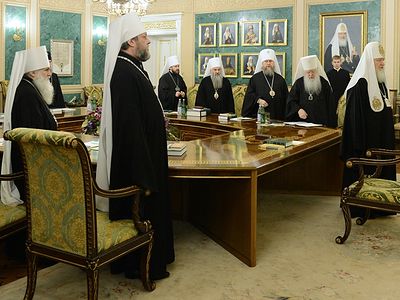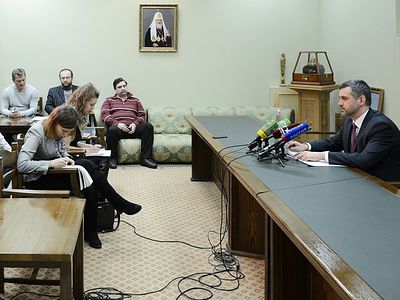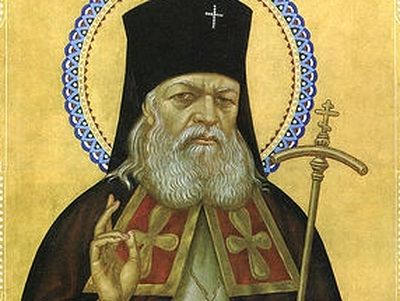Source: RT.com
The region of Crimea has decided on a referendum to join the Russian Federation in a vote that was branded illegitimate and undemocratic by the West – even before it took place. But not everybody in Europe agrees and today Sophie talks to somebody who witnessed the Crimean vote firsthand – Austrian MEP Ewald Stadler, an observer on the referendum.
Sophie Shevardnadze: Ewald Stadler, Austrian politican, member of the European Parliament, it’s great to have you on our show today. You were observing the referendum in Crimea. Why did you decide to go as an observer in the first place?
Ewald Stadler: I decided to go because I had the impression, through studying the European media and through discussions in the European parliament, that a targeted anti-Russian atmosphere was being created here. I wanted to see for myself what the local situation was and I can tell you today that what I had seen in the media and what I’ve seen myself on the ground, on the Crimean Peninsula - those were two different worlds. The media reports conveying a picture of uncertainty and conflict were false; the situation there was in fact completely different.
SS: Well, since you brought it up, there is a lot of talk that the referendum in Crimea was conducted under pressure, gun-point, even. You were there. Is there any truth to that?
ES: I did not once see any voter being put under any pressure. The law enforcement personnel that I saw were not armed. The police force that were standing in front of the election stations were similar to that which I’ve seen in every other country where I’ve been present as an election observer. That is, it was completely normal. It was a completely normal, relaxed atmosphere.
The law enforcement officers stationed at the entrance to the polling stations had no difficulty keeping order because the people were behaving properly. They wanted to take part in this referendum so much, they stood in long queues, with law enforcers there to ensure that it went smoothly. No one was pressured, no one was forced to vote either way, the people came voluntarily in their droves and I did not once see anyone being obstructed from voting with his ballot paper.
SS: Apart from the process of the referendum itself, what are your general impressions of the attitude to the events in the Crimea?
ES: The media coverage as I perceived it in the Crimea seemed accurate to me. The media in the Crimea reported on the situation as it really was. There was no reason to report on it any differently. There was a very relaxed atmosphere. The people were even happy about the result and about the referendum and I got the impression that a lot of people had been waiting for this moment for a long, long time - to be able to vote for Russia, for the chance to join Russia.
SS: Here’s a thing. International observers seem to agree that referendum complies with all international standards. Why are Brussels and Washington insisting it is undemocratic, and also, why send observers at all, then, if they think its undemocratic?
ES: No, I can’t understand that either and let me explain the context for that lack of understanding. If you consider the vote on the Maidan, so to speak, as a legitimate referendum, where there was no set procedure at all, just violence. If that is legitimate, then I ask how a voting procedure can be considered illegitimate where there were voting lists, where there were international observers, where the people were free to vote as they pleased, where people could exercise their right to self-determination as guaranteed by the UN Charter. I even dug the UN Charter out for some Austrian journalists. Article 1 paragraph 3 of the UN Charter talks expressly about the right to self-determination of peoples, not the right to self-determination of states.
So if the population of Crimea can do all that, and we compare that to events on the Maidan, then I ask: what moral justification is there for anyone to criticize the referendum in Crimea? I would suggest there is none whatsoever.
SS: Also, the other question is, the European Parliament is saying Crimea’s referendum doesn’t comply with Ukraine’s Constitution, but why nobody called on Kosovo or Slovenia and Croatia for that matter to follow former Yugoslavia’s Constitution when they were declaring independence?
ES: It’s perfectly clear that the events that happened with Yugoslavia had nothing to do with the Yugoslavian constitution. I don’t want to criticize that, I welcomed Croatian independence, I welcomed Serbian independence, I welcomed Slovenian independence, and Slovenia is on the Austrian border. I don’t want to criticize that, but if you can accept that the secession of the countries from the former Yugoslavia and their independence is not connected to the Yugoslavian constitution, then you have to accept the decision of the people in the Crimea.
In general, I’ve never yet seen any secession from an existing state take place in full harmony with the constitution, and I’ll say again that the current putsch government in Kiev - which has absolutely nothing to do with the constitution - it has come to power in complete disregard of every provision of the Ukrainian constitution. And I have to say the following: if they had postponed the referendum or held it any later, it would not have changed the outcome, it would only have been made things more dangerous, because the later the referendum was held, the more the criminal gangs on the Crimean peninsula would have come to the forefront, and would have caused disruption to the point of civil war.
SS: The European politicians are saying they will an Association deal by the end of the month. You call the deal “a massive mistake” of EU diplomacy – why do you think so?
ES: The fact that Ukraine was forced last autumn to sign the association agreement was already a mistake, if, in particular, we consider the fact that the European Union actually offered Ukraine nothing in return. Furthermore, I consider that it is unacceptable to sign an association agreement with the putschist government - with a government which is not legitimate from the point of view of democracy, with a government which came to power violating the terms of the Constitution of Ukraine - even if it is just the political part of the agreement. This government is not legitimate and has no legal power to sign any international agreements.
SS: OK, so if we rewind a little bit, and talk about the agreement - the EU insists in the first place that the agreement is not against Russia, but they refuse to involve Russia in the talks. What was the problem there?
ES: I had the impression right from the start that this association agreement was directed against Russia to prevent Ukraine taking part in the Eurasian Union. I have absolutely no problem if countries want to unite themselves with Russia in the Eurasian Union. We should always try to view Russia as a partner and to see room for dialogue with Russia and not to construct a hostile image contrary to evidence.
SS: And right now, after all that happened, EU is ready to sign political – only the political chapter of the agreement – without the economic part. What actually happened to the economic part and what does it mean, just the political part? Is it just empty words?
ES: If the European Union is ready only to sign the political part of the agreement, that is, the part against closer ties with Russia, and is not willing to sign the economic part, it means only one thing: that nobody in the EU is ready to fulfill the financial promises made to Ukraine.
If the economic part was signed together with the political part, I doubt we could provide enough funds - but I must notice at once that I am also against signing both political and economic parts of the agreement with this government. Ukraine needs so much money that we will never be able to provide enough to cover their needs. I would like to say it to the Ukrainians openly: we are not able to provide that much cash. Currently we are barely able to cover expenses related to the crisis in Greece, how could we manage to deal with Ukraine, with this financial black hole? Nobody in Europe will provide that much funds to Ukraine.
SS: So that’s why I am asking, changing the whole package of an agreement to just the political chapter of the agreement, what that really means is that “we’re not really signing a deal with you, but we don’t want to be seen like we’re lying to you, so here’s a bogus paper that we’re going to sign, but we’re not really going to help you economically, while that’s what you really need right now” – do I understand this correctly?
ES: This idea, that only a political agreement would be signed, has no other purpose than to exploit or abuse Ukraine in order to gain political leverage against Russia. This deal has no other purpose.
SS: And the political part of it that’s going to be signed, that’s actually to keep the Ukraine also hooked on – is that it? Like giving Ukraine false hopes?
ES: Yes, that’s my warning to the Ukrainian people that these are false, very empty promises. I can only give a warning, the putsch government in Kiev must legitimize itself, but there’s no legitimacy. You can only have legitimacy in a democracy, only through the direct voting of the population, but not through just political dealings with the European Union or anyone else in the world.
SS: You have said that EU’s economic decisions are aimed at Russia – why? What’s in this for EU?
ES: I think that is a political attitude linked to America. American pressure on the European Union is very strong. In particular it’s clear that since the Munich Security Conference, the German government has done exactly what Washington says and asks, to the extent that the European Union has allowed itself to be forced by the Americans into an anti-Russian stance against its own interests. This is truly dramatic, especially as there are parliamentarians who obviously behave this way with a certain level of consistency, even a certain fanaticism.
I have seen colleagues in the EU Parliament expressing such fanatical positions, Russophobic positions, that they were totally incomprehensible to me. It really worries me. I’m really worried about peace in Europe.
SS: But can it be really in EU interests to ruin relations with Moscow?
ES: At the moment it’s really only my own government that would even be in a position to do so, but it’s not taking any action, regrettably, because everyone else is just following the herd and thinking they can persuade the Russian government to adopt a particular position or change its position by means of sanctions. That’s the wrong language in diplomatic matters, in diplomacy you should talk to your partners, but not with threats and sanctions. And in this respect the Austrian Federal Government, as a neutral would be in an especially good position to build up a new level of dialogue with Russia, with the Russian Federation. To put it in graphic terms, the dialogue has to shift from the Brussels level and the Berlin level to the Viennese level.
SS: You’ve called EU’s policy against Russia “a colossal failure”. So what’s in store for EU-Russian relations now?
ES: Right now we’re at a crossroads. In the future everything will depend on whether the power of reason and conversation will get the upper hand or the proponents of war and parties involved in conflict, that is, the hawks, will win. Now those pushing for sanctions, the conflict initiators and warmongers are the ones who have the upper hand. But I call on all in the European Union, particularly those with responsibility, to return to the negotiating table, because the way things are turning out is not foreseeable, not assessable. I would never have thought, not even a year ago, that people would try to gain political leverage against Russia with so much idiocy in the Ukraine. I wouldn’t have believed it was possible. It’s completely irrational. It’s irrational and completely at odds with classical, rational diplomatic considerations. I really can’t say how the European Union thinks it will go continue in the future.
SS: What you’re proposing is diplomacy and reconciliation, why doesn’t what you propose ever happen?
ES: I’ve already said that, but I must say it again that it is pressure from the USA. Brussels’s policy will correspond to what Washington does. It will correspond to America’s. And Berlin will not act differently as before, and unfortunately Brussels will act as decided by Washington. However, no later than at the Munich Security Conference a lot will be expected from the US, because Germany does not play any important role in UN security interests, so it will be demanded that the US take everything upon itself, as the major power.
SS: You keep saying that the EU is under strong pressure from America – so you’re basically saying that EU is incapable of acting and deciding on its own…what could the US possibly do to Europe if Europe were to decide and take another path? The path of diplomacy, for example. Impose sanctions on EU, bring in American troops? What could America possibly do?
ES: No, these are such serious economic liabilities. You should understand how much the USA influences the political situation in Europe. It can influence for just one evening, a single issue, even when it is necessary to evaluate different positions. Foremost, the US influences the policy of France, the UK and, in particular, the policy of Germany. It happens through gentle, but very efficient mechanisms, for example via the media, because any politician depends on it. In fact, influence upon public opinion is a very efficient and powerful mechanism. And in general, European policy is strongly linked to outside pressure from the US.
SS: So you’re saying it’s informational war on all levels, it’s media war on all levels?
ES: Yes, my concern is what is going to come out this escalation. How can anyone have any interest in escalation unless they want to move the situation to the brink of war? The situation is much more dangerous, I consider it much more dangerous than the way it is portrayed by the media. Escalation only makes sense if the next step is going to be followed by the next step, and no reasonable person can have any interest in that, but that’s precisely the political line we’re following right now. It’s very regrettable. Unfortunately the only thing we can do about it is to try to inform people, spread as much information as possible. There are no other tools available.
SS: What will it take for the EU to recognize the will of Crimean people? What should happen?
ES: That is the only tool there is, the only way is to inform public opinion about the true events, that is the only way, and that is what Russia’s opponents are most afraid of. That’s why we have such a strong interest in an objective portrayal and my task as an election monitor was to try to create that objectivity.
SS: So would you say it’s the 21st-century new era of media war, because what you’re saying is basically “it’s a war between the media”, the media of the West and the media of the East. Is this how the war in 21st century looks now?
ES: That’s, that’s true, yes. Unfortunately it’s true that there is currently a... so to speak... a war-like quarrel going on at the level of the media. It’s a [...] new media war. This could spill over at any time into some other, more dangerous playing field, and that should not be underestimated, the danger is very, very high. And the argument has taken a new format that has wiped out the old format from the Cold War. It’s really deplorable that we’ve ended up at this level at the beginning of the 21st century, it’s absolutely deplorable.
SS: On a different note – Venice wants to separate from Italy, Catalonia from Spain, Scotland from the UK. In your opinion, what’s the reason for the separatist sentiment inside the bloc?
ES: Yes, it will be very interesting. It is doubtful that someone will be able to forbid Scotland from leaving the UK. It will be difficult to forbid the Catalans to leave. I am sure that it will be difficult to forbid the Venetians to leave. Certain states within the EU are obviously afraid of their citizens, they are afraid of the citizens which want to use their right to self-determination, in accordance with the Charter of the United Nations. However, I would like to point out the main points of the attitude of European ruling circles towards the citizens of their countries. Nothing can make the nomenclature elite feel uneasy better than the word 'referendum'.
The European Union has not passed a single referendum successfully on the first try, which means that the European Union avoids referendums like plague. The European Union plays democracy but does not follow its principles. It is also related to the situation which is unfolding at the present moment. If one conducts a population survey, the opinion of the people will not coincide with the opinion of the government. Sometimes the opinion of the people is drastically different from the opinion of the European governments. It means that the word 'referendum' is a dangerous word for the ruling elite of the European Union.
SS: Would you say it’s a dangerous trend though? I mean, you’re an Austrian, for example: let’s say Tyrol wants to have its own referendum and separate from your country. Would you say “OK, let them have their will and separate from us”?
ES: Of course. Yes, that’s not even questionable. The Scots and the Catalan people, I would say the South Tyroleans too, they all have the right, in my opinion, to determine where they want to live through a referendum. They tried to create a European super-state, so it would no longer be necessary to abandon the old national association of states, that was the drive, or one of the drives, of the European Union, but now no one believes in it and the Scots will probably want to leave the United Kingdom which I understand, but when there is a clear, clear majority like on the Crimean Peninsula, and you only need more than 50 percent, then that must be respected. That’s not even a question for me. The will of the people comes before the will of the government or the will of the Chancellery.
SS: So let’s say the Scots and the Catalonians have their 51 percent for independence – than what would make those referendums different from the one in Crimea; why are they possible, and the one that just took place in Crimea isn’t?
ES: I’m no fortune-teller. I can’t predict how the Spanish government would react to that, but I know how the European Union reacts to referendums. It’s literally allergic to them. Look at the referendum that happened in Switzerland a few weeks ago about how much immigration should be allowed from the EU into Switzerland - they reacted to it literally hysterically. I know that at a European level they react hysterically towards referendums and the results of referendums if they don’t correspond to what the bureaucracy wants.
So I don’t know how the Spanish government or the EU would react to that but I don’t expect there would be great pleasure there if a referendum in Catalonia showed majority support for separation.




